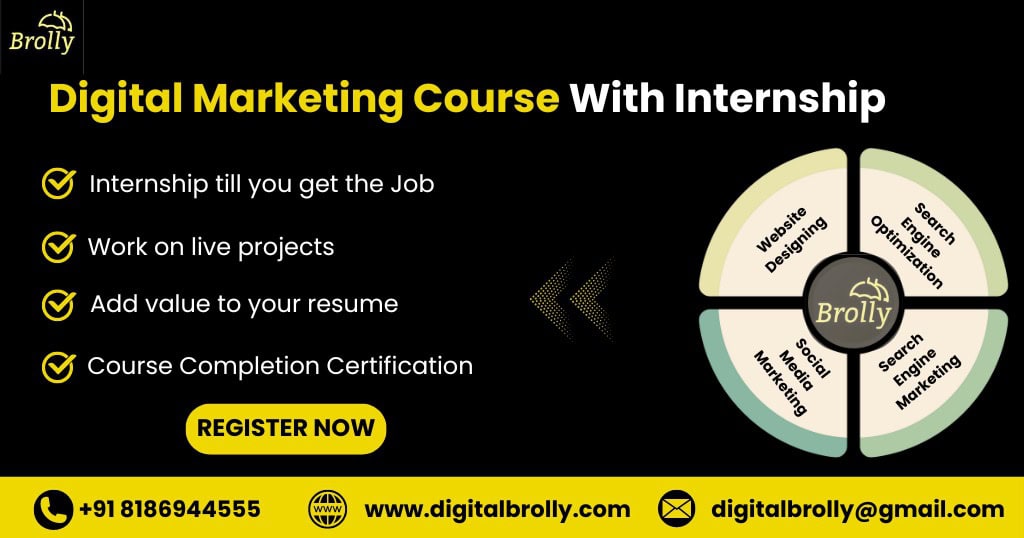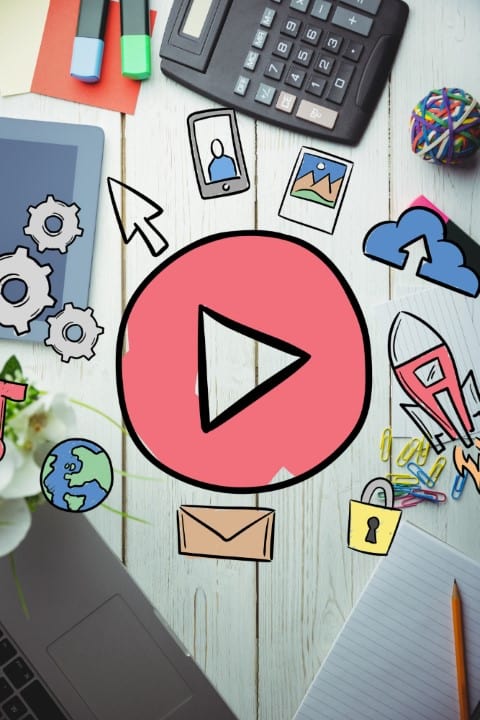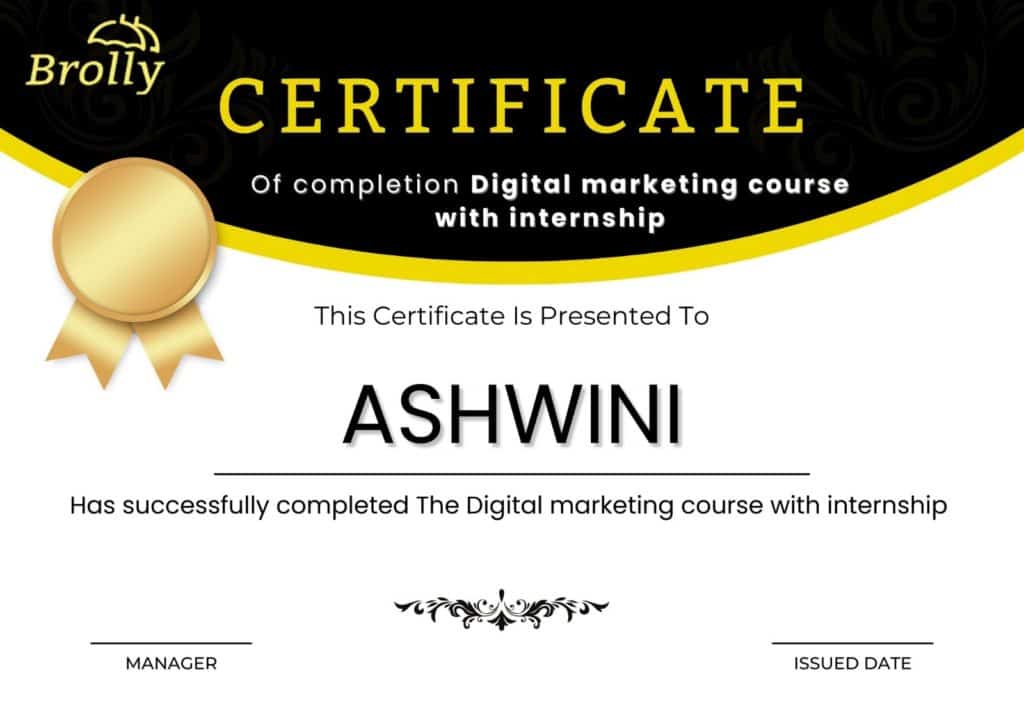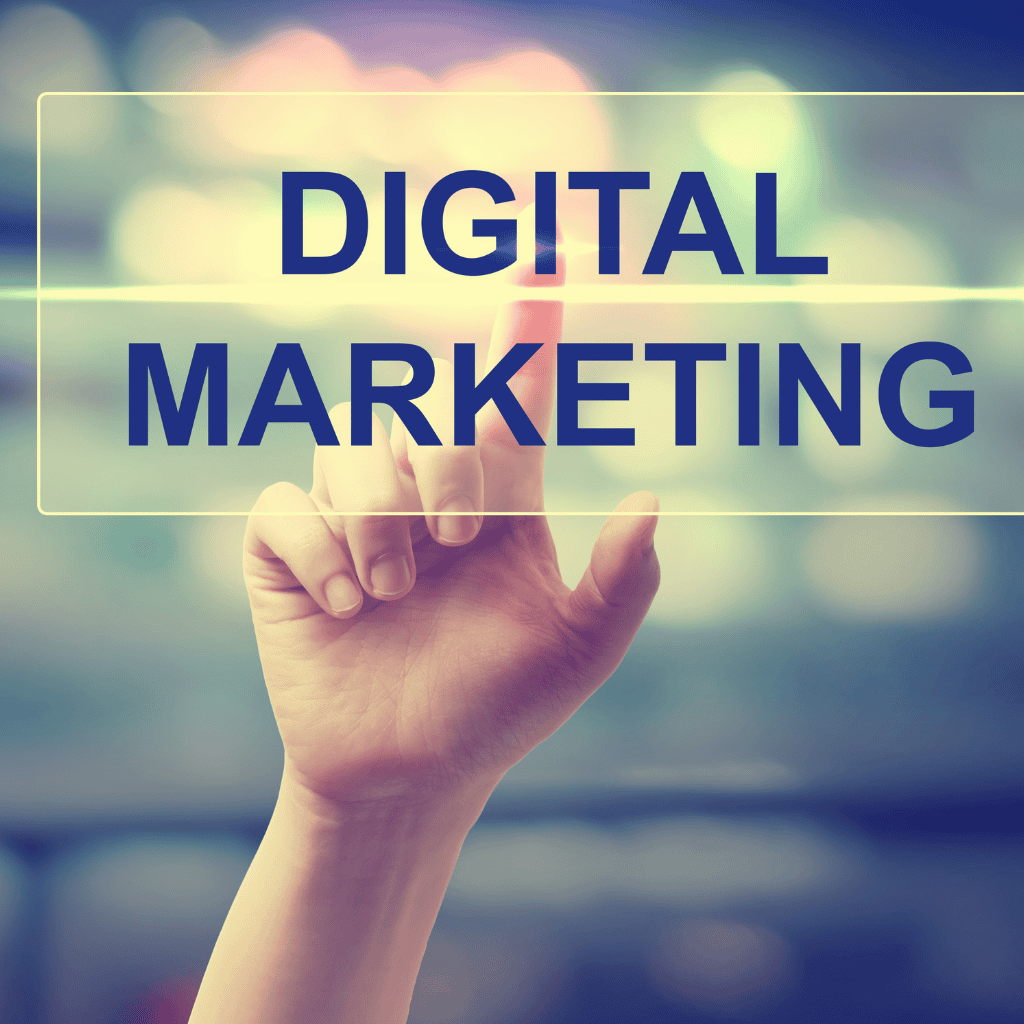Digital Marketing Course with Internship
Placement Assurance + internship Certificate
Online Class Room Live ProjectsBest For Freshers & College Students
Table of Contents
ToggleDigital Marketing Course with Internship
Batch Details
| Trainers Name | Mr. Ravi Varma, Mrs. Ambica Kiran |
| Trainers Experience | 15+ Years, 7+ Years |
| Next Batch Date | 2nd July 2025 (5:00 PM IST) (Offline) |
| Training Modes | Offline, Online Training (Instructor Led) |
| Course Duration | 3 Months |
| Call us at | +91 81869 44555 |
| Email Us at | digitalbrolly@gmail.com |
| Demo Class Details: | ENROLL FOR FREE DEMO CLASS |
Digital Marketing Course with Internship
Why Learn
- Small business owners have the opportunity to enhance their businesses Return On Investment (ROI)
- Individuals searching for Employment Opportunities in the field of Digital Marketing
- Explore opportunities for passive income, Such as affiliate marketing or creating digital products.
- Digital marketing skills are in high demand across various industries, increasing job opportunities.
- People who are working in one field but want to switch to Digital Marketing and learn it as a new skill for their career
- Students have the chance to acquire Digital skills and begin earning money online through the use of Digital Marketing
- Sales professionals can boost their careers by learning Digital Marketing
- People looking to generate a secondary source of income
Digital Marketing Course with Internship
Curriculum
1. What is Marketing? – Understanding Definitions & Meaning in detail.
2. 4 P’s of Marketing – Marketing Mix and Its importance
3. Types of Online Business and their Objectives.
4. Definitions of Branding, Marketing, Advertising, Promotions and Sales
5. Market Segmentation, Targeting and Positioning (STP).
6. Real World Case Study Examples.
1. What is Digital Marketing?
2. Types of Digital Marketing?
3. Digital Marketing Vs Traditional Marketing
4. Traditional Marketing Funnel
5. Digital Marketing Funnel
6. What are Impressions?
7. Brand/Product Visibility
8. What is CTR & How is it calculated?
9. What is Traffic?
10. Types of Traffic based on the source
11. Types of Traffic based on the Audience
12. Difference between targeted traffic & non-targeted traffic
13. What are leads?
14. What are sales?
15. What is Visitor Engagement?
16. How to increase Visitor Engagement?
17. What is Bounce Rate?
18. How to decrease bounce rate?
19. How to convert Traffic into Leads or sales?
1. Different ways to earn money online from websites.
2. Different ways to earn money online using videos.
3. Importance of blog in making money online.
4. What is Google AdSense
5. How to get your website approved for Google AdSense
6. Determining Ad positions and earning money from AdSense.
7. How to earn money by Making Videos and uploading them on YouTube Videos
8. YouTube AdSense and tricks to get your channel monetized
9. Other monetization methods on You tube
10. Earning money from YouTube even before YouTube Monetization
11. Earning Money From Affiliate Marketing
12. Step by Step process on how to earn money from Affiliate Networks.
13. More ways to monetize video content online -Skill share, Udemy &more
1. What is a Web Browser? & Types of browsers
2. Difference between Browsers and Search Engines.
3. What is a Webpage?
4. What is a Website?
5. What do you need to create a Website?
6. What is a Domain name?
7. What are Domain extensions?
8. How to choose a domain name for your Website?
9. How to buy a domain name?
10. What is a hosting Space/Server?
11. Different types of hosting
12. Which type of hosting to buy?
13. How to choose a best hosting provider?
14. Buying Hosting online.
1. What is CMS?
2. Why WordPress?
3. How to install WordPress on Local host (Your personal computer)?
4. How to install WordPress on Server?
5. WordPress Dashboard Brief
6. What are Pages?
7. What are Posts?
8. Difference between Pages and Posts?
9. How to create a Page and a Post?
10. What are categories?
11. How to create categories?
12. How to create different types of menus in WordPress?
13. Different types of Widgets and their usage
14. What is a Theme and its Importance
15. How to install a theme and activate it?
16. How to choose the Right Theme for your website?
17. What are Plugins? and their Importance
18. How to allow / block the crawling for your website?
19. Page Builder Plugins for designing custom pages
20. How to design a Home page?
21. How to create a Blog?
22. How to create Contact forms and registration forms on your website?
23. How to create an E-commerce website for free?
24. How to integrate a Payment Gateway (adding payment links) to your website?
25. How to build a sales funnel on WordPress?
26. How to optimize images on your website?
26. How to optimize your website for loading fast?
27. How to handle your website security?
28. How to maintain backups for your website?
29. List of very important plugins that are must for a website
30. Changing URL structure for SEO purpose.
31. Add live chat options to your websites
1. What is SEO?
2. Different types of SEO
3. What are the advantages of SEO?
4. Disadvantages of SEO
5. What is SERP?
6. Understand Search Results
7. How google works in the backend?
8. What is Crawling?
9. What is Indexing?
10. Rank Math Algorithm and importance of relevancy
11. What is Google Sandbox?
12. Does Google Sandbox Exist?
13. Google Algorithm updates.
14. Special note on Panda, Penguin, Hummingbird updates.
15. Note Latest Bret Update & Upcoming Web Vitals Update.
16. Step by Step process on how to do SEO for a new website?
1. What are Keywords?
2. Different types of Keywords for SEO purpose.
3. Differentiating keywords based in user intentions.
4. What is search volume? and its importance.
5. What are LSI keywords?
6. What are intent defining keywords
7. Difference between money making keywords and informational keywords
8. How to get new keyword Ideas using Google
9. Tools to use for more keyword ideas
10. How to find search volume and tools to use?
11. Keywords Research Process
12. How to find profitable keywords for your business?
13. How to analyse difficulty of keyword?
14. How to analyse competitor keywords?
15. Deciding on keywords to target.
16. How to create strategies on how to outrank your competitors?
1. Generating content ideas
2. Forming a content framework/blueprint
3. Essential elements that your content should contain.
4. How to proofread or check the content for grammatical errors?
5. What is Plagiarism?
6. How to check the plagiarism of the content.
7. Best practices in content writing
1. Fundamental ON Page Factors.
2. How to write SEO optimized title for your Web Page/Post.
3. How to write attractive and description to get more clicks.
4. Best practices in writing page/post URLs to rank better
5. How to optimize the different types of Headings
6. The core content optimization principles.
7. How to use LSI keywords, synonyms and intent words for better rankings.
8. Structuring your webpage and prioritizing content for SEO
9. How to optimize Images on the website for image rankings.
10. Importance of Image file name, Image Alt tag and its size.
11.Optimizing content for visual search appearance
12.Importance of questioning words & FAQs on your page/post.
13.Importance of videos and optimizing videos on the page/post.
14.How to use SEO tools to cross check the ON page factors implementation.
1. Basics of Technical SEO
2. Website Structure & navigation optimization for SEO
3. Indexability of the website.
4. Tracking and fixing indexing errors.
5. Importance of Internal linking in SEO
6. Impact of Page Speed on SEO
7. Using GT Metrix & Lighthouse for speed reports.
8. Importance of UX Signals for SEO
9. Core web vitals and their importance.
10. Robots.txt & Sitemap.xml creation.
11. HTTPS & Website Security
12. Tracking and fixing broken links
13. custom 404 page
14. Importance of mobile responsiveness & mobile compatibility.
15. Touch friendly factors to boost UX and site rankings.
16. Other Technical aspects to monitor
1. What are Rich snippets.
2. Different types of Rich snippets.
3. How to optimize content for different types of featured snippets.
4. How to create site link snippet?
5. How to create Product, Rating, Review snippets?
6. FAQ Snippets and their benefits.
7. Importance of structured data tables on webpages/posts.
8. Other types of snippets and their optimization techniques.
9. Creating AMP pages and their benefits
1. What is OFF Page SEO?
2. Difference between ON Page and OFF Page.
3. Why is OFF Page SEO important?
4. Backlinks and their importance
5. What are backlinks
6. Types of backlinks
7. Do’s & Don’ts in Link Building
8. Importance of Anchor text in link building
9. What is Domain authority?
10. How to check a Websites Domain Authority?
11. How to increase a Websites Domain Authority?
12. What is spam score?
13. How to check for your websites spam score
14. Getting High quality Backlinks
15. Email marketing for backlinks
16. Link Building strategies
17. Advanced techniques in Link building
18. Unnatural links and their disadvantages
19. Monitoring Link Profile of your website
20. Maintaining Link health to avoid penalties
21. Process to remove spam links using disavowing tool
22. Establishing Brand Signals to boot rankings
23. EAT & their value
24. Other Key OFF Page techniques
1. Basics of Local SEO – What, why, how
2. The Map Pack – understanding the local SEO results.
3. Keyword Research for Local SEO
4. Create a listing on Google My Business (GMB)
5. Key optimization factors in GMB
6. Product listing, Services listing in GMB
7. GMB website builder tool.
9. Importance of images optimization and posts in GMB
10. What are NAP Citations
11. Importance of citations in Local SEO
12. Key local SEO Ranking factors
13. Importance of Social Presence & check-in’s for local SEO.
14. Importance of Online reputation Management for Local SEO.
1. What is Google Search Console?
2. Importance and uses of Google Search Console (GSC)
3. How to integrate your website with GSC?
4. Different types of website verification methods?
5. Setting Geo-target locations.
6. Analysing keywords, their positions and CTR’s
7. Comparing results over time of different keywords.
8. Filtering keyword analysis over countries, devices and more.
9. Check for indexability
10. How to request for Page indexing
11. How to check for snippets and errors.
12. Fixing crawl errors.
13. Monitor and fix mobile responsive errors.
14. Monitoring and fixing Web load speed issues.
15. Monitoring and fixing page not found errors.
16. How to use GSC for more keyword opportunities and ideas.
1. How to earn money from SEO
2. New website SEO step by step process
3. SEO Optimization check list
4. Creating SEO Performance report
5. SEO Interview Questions
6. Free SEO tools list
7. Paid SEO tool exposure.
8. SEO techniques E-book & Material
9. SEO site Audits
1. What is SEM?
2. Difference between SEO & SEM?
3. Inorganic Search Results
4. Introduction to Google AdWords & Pay Per Click Advertising
5. Setting up a Google AdWords Account
6. AdWords Dashboard overview & Walkthrough
7. Types of networks in Google Ads
8. Different types of campaigns
9. Types of Ads
10. How to create a Text Ad
11. Different types of Text Ad extensions.
13. Do’s and Don’ts in Text Ads
14. Google Ads Account Structure
15. Types of cost models in Google Ads
16. Different types of keywords in Google Ads.
17. How Google Ads define Ad positions
18. Factors that influence Quality Score.
19. How to increase your Ads Quality score.
20. Creating High Quality Landing pages
21. Different types of bidding strategies
22. How google Bidding/Auction works
23. Key terms in Google Ads – Impressions, Clicks, CTR, Avg CPC, Conversions, Conversion rate, Cost, Cost per Conversion, Impression rate, Avg CPM, Avg CPV, conversion value, conversion value per cost.
24. How to launch a search campaign
25. Choosing Campaign objective, Campaign and Ad Types.
26. Naming a Campaign
27. Choosing a network
28. Choosing Target audience – Language targeting, Location Targeting, Demographics, Retargeting, interest based targeting
29. Getting your Ad budgets right
30. Creating Ad Groups.
31. Creating Ad copies.
32. Types of Display Ads
33. Launching a display campaign
34. Types of Video Ads
35. Launching a video campaign
36. Ad optimization score and tips to improve
37. Conversion tracking
38. Generation Google Ads Reports
1.Introduction to Google Analytics
2. How Google Analytics works?
3. How to set up Analytics Account for your website?
4. Google Analytics Dashboard
5. Analyzing Audience
6. Analyzing website traffic Sources/Channels
7. Analyzing Audience Demographics
8. Analyzing traffic Behavioral flow
9. Analyzing traffic location & Languages
10. Goals and Conversions
11. How to set up Goals?
12. Types of Goals
13. How to Integrate AdWords and Analytics account?
14. How to set up Filters?
15. How to Generate reports in Google Analytics?
1. What is Email Marketing?
2. Email Marketing Basics
3. Advantages of Email Marketing.
4. Types of Email Marketing
5. Do and Don’ts in Email Marketing.
6. Email Marketing Platforms – tools.
7. Using Email marketing tools for Lead Generation.
8. Auto-Responders.
9. Designing Newsletters.
10. Creating mailing sequences
11. Generating sales from Email Marketing – Product sales, Affiliate sales
12. Avoiding spam folder – Double option.
13. Bulk Emailing.
14. Best practices to send bulk emails.
15. Reports Metrics and Analysis.
16. A/B Testing & Improving ROI.
17. Mail blast
18. Best tool for Bulk mailing
19. Writing subject lines for high CTR
1. Social Media and its Importance in Digital Marketing.
2. SMM Vs Social Media Optimization (SMO).
3. Introduction to Facebook.
4. Facebook account setup.
5. Facebook for Personal Account and Its Elements.
6. Creating a post.
7. Facebook Page for businesses.
8. Different Types of Business pages offered by Facebook.
9. Profile Pic and Cover photo dimensions for pages.
10. Types of Posts and Statistics.
11. Hashtags and its advantages.
12. Facebook Page Designing.
13. Engaging Fans and Increase the Likes.
14. Page management options.
15. Facebook Events creation.
16. Facebook Insights.
17. Facebook Groups.
18. Facebook groups & types of groups
19. Importance and advantages of running a community on Facebooks
1. Introduction to Facebook Advertisements.
2. Difference between Facebook Advertising and Google Search Advertisements.
3. Types of Promotions with Facebook Advertisement.
4. Targeting the Audience.
5. Advanced Audience Targeting.
6. Ad Formats.
7. Conversion Tracking.
8. Integrating Facebook Pixel with your website.
9. Retargeting on Facebook.
10. Understanding Facebook’s ads account structure
11. Creating landing Pages/Funnels for Ads.
12. Important tips and tricks to create successful landing pages/funnels.
13. Understanding campaign Structure and their objectives.
14. Running different types of campaigns on Facebook.
15. Different types of targeting on Facebook
16. Age, gender, location, Behavior, interest and other demographics based audience targeting.
17. Other different types of targeting
18. Optimizing and Spending controls
19. Ad copy creation techniques and types.
20. Ad creative design and types.
21. Creating and setting up Pixel
22. Custom conversion tracking
23. Attributions
24. Audience Retargeting
25. Remarking with custom audience
26. Remarking with Lookalike audience
27. Creating campaign with lookalike audience
28. Metrics & Optimizations
29. How to handle negative comments on Facebook Ads
30. Scaling Facebook Ads – Scaling with Audience expansion, Ad set scaling , CBO scaling , Ad account , Snipper method
31. How to work as a Freelancer running Ads for clients
1. What is Instagram Marketing
2. Why should you use Instagram for your business
3. How to increase followers on Instagram
4. Tips to get good Engagement on Instagram
5. Best Instagram Marketing Tactics
6. Instagram Hashtags
7. Instagram Stories & their importance
8. 60 seconds on Instagram – Instagram Video Ads.
9. Instagram paid advertising
10. IGTV and its importance
1. Introduction to LinkedIn.
2. LinkedIn for SEO.
3. Benefits of LinkedIn Network.
4. LinkedIn Profile Creation.
5. Optimizing the profile.
6. Skills and Endorsements.
7. Recommendations on LinkedIn.
8. Adding new connections.
9. LinkedIn Posts.
10.LinkedIn Groups.
11. Finding Jobs on LinkedIn.
12. Creating a business page on LinkedIn.
13. LinkedIn business page customization.
14. LinkedIn Page Posts.
15. Retargeting Profile views
16. Retargeting LinkedIn Marketing
17. Leads Generation in LinkedIn
18. Types of Ads in LinkedIn
19. Different types of Ads in LinkedIn
20. Different types of campaigns and objectives
21. Audience targeting
22. Adformats & Placements
23. Budget & scheduling
24. Conversion tracking
25. LinkedIn Audience network
26. Lookalike Audience
27. Custom Audience
1. Exploring content ideas
2. Content research
3. Tips to write good quality content
4. Content Spinning techniques
5. Plagiarism check for content
6. Readability check for content
1. Introduction to Affiliate Marketing.
2. How Affiliate Marketing Works?
3. Earning Money from Affiliate Marketing.
4. Affiliate Marketing Networks.
5. Affiliate Marketing Niches research
6. Affiliate Marketing execution & Tips
7. Affiliate Marketing Tools.
8. Best proven strategies to make money from Affiliate Marketing.
9. Live Case Studies.
10. Amazon Affiliate Network – Physical Products – India & US
11. Impact Affiliate Network – Digital Products & Services
12. Admitad Affiliate Network
13. Other Popular Affiliate Network – Click bank , JV-zoo, Commission Junction
14. Affiliate marketing execution & tips
15. Affiliate Marketing tools
16. Best proven strategies to make money from Affiliate marketing
1.YouTube Marketing Introduction.
2. Creating Channel on YouTube.
3. Types of Videos.
4. Uploading video.
5. YouTube Video SEO.
6. Annotations and End Cards.
7. How to use Playlists.
8. Understanding Copyrights and Spam.
9. YouTube Creator Studio Dashboard.
10. YouTube Analytics.
11. YouTube channel Suspension, Policy Violation rules.
12. How to create different types of videos
13. Screen recording tools
14. Video making tools
15. Video editing tools
16. How to upload videos on YouTube
17. YouTube SEO ranking factors
18. Keyword Research for YouTube
19. YouTube Title , description , Tags optimization
20. How to design attractive thumbnails
21. End screens and cards
22. How to use Playlists
23. YouTube SEO tools for Ranking
24. Understanding Copyrights and claims
25. Making Money from YouTube
26. YouTube AdSense Monetization Tricks & Tips
27. YouTube Partner Program YPP approval
28. YouTube comment moderation
1. Best Freelancing sites.
2. Creating a profile in Freelancing websites.
3. Applying for works on Freelancing websites.
4. Tips for getting projects on Freelancing websites.
5. Establishing network to get freelancing projects
6. Writing professional email to clients.
1. Interview Questions
2. Resume Preparation
3. Digital Marketing Terminology
1. Google AdWords certification
2. Brolly Course completion certificate
3. Internship Certificate with brolly
4. 1 Year work Experience certificate**
5. Google Ads search certification
6. Google Ads Display certification
7. Google Ads Video certification
8. Google Ads Measurement certification
9. HubSpot Certifications
- Hands-on Project Work
- Campaign Management
- Performance Analysis and Reporting
- Collaboration with Industry Professionals
- Real-world Problem Solving

Digital Marketing Course with Internship
What is Digital Marketing
- Digital Marketing: Digital marketing helps businesses build and improve their visibility on the internet through websites, social media, and online ads.
- Social Media Marketing: Uses platforms like Facebook, Instagram, and Twitter to connect with audiences, build brand awareness, and generate traffic.
- Data Analytics: Provides tools to track and analyze marketing performance, helping businesses to make improve their strategies.
- Content Creation: Making engaging content like blogs, videos, and infographics to attract and interest potential customers.
- Targeted Advertising: It allows for precise targeting of audiences based on demographics, interests, and behavior, improving the efficiency of marketing campaigns.
- SEO (Search Engine Optimization): Optimizes websites to rank higher in search engine results, increasing visibility and organic traffic.
- Search Engine Marketing (SEM): By using paid advertising on search engines to boost visibility and attract more visitors to a website through targeted ads.
- Email Marketing: Uses email campaigns to communicate directly with customers, promoting products or services, nurturing leads, and improving conversion rates.
Digital Marketing Course with Internship
Key points
- Comprehensive Curriculum
Learn essential digital marketing topics like SEO, SEM, SMM, and content marketing. Get both basic and advanced knowledge to succeed in the field.
- Hands-On Learning
Work on live projects and case studies to apply what you’ve learned in real situations. This practical experience helps you see how to use strategies effectively.
- Real Time Experience
Complete an internship where you work directly on digital marketing campaigns. Gain industry experience and build a strong portfolio.
- Expert Instructors
Learn from experienced professionals who share their industry insights and practical knowledge. This helps you understand the field better.
- Internship Opportunities
Acquire practical experience through our internship programs. Gain hands-on experience in a professional environment. These internships boost your resume and career opportunities.
- Flexible Learning Options
Choose from online or classroom sessions. Learn at your own pace with flexible scheduling options. This allows you to balance learning with your other commitments.
- Networking Opportunities
Create a strong network of professionals in digital marketing to help you find new career opportunities and grow in the industry.
- Career Support
We offer comprehensive support in finding jobs and building your career. Get help with resume writing, interview preparation, and more. Our team is dedicated to your success.
- Certification
Receive a recognized certification after completing the course. This credential helps you in your job search. It shows employers your commitment and expertise.
Digital Marketing Course in Hyderabad
Student Testimonials
Digital Marketing Course with Internship
Reviews
Eligibility Criteria
01
Educational Background
Individuals from any background, including undergraduates, graduates from any field, those with career gaps, and freelancers.
02
Basic Computer Skills
Basic computer skills and familiarity with using the internet are often necessary. This includes knowing how to use common software applications and online platforms.
03
Communication Skills
Having strong communication skills, both written and verbal, is crucial for success in a Digital Marketing course and career.
04
Analytical Skills
A basic understanding of analytical thinking is beneficial, as Digital Marketing .
05
Creativity
Creative thinking is frequently needed in Digital Marketing for tasks like content creation, campaign strategies, and problem-solving.
06
Passion for Digital Marketing
Having a sincere interest and passion for the Digital Marketing industry is crucial.

Digital Marketing Course with Internship

Certifications
- Digital Brolly - Course Certification
- Internship Letter
- Internship Acknowledgement Letter
Digital Marketing Course with Internship
Modes
Classroom Training
- Certified Trainer With 15+ Years of Experience
- One-One Project Mentors
- Live Projects Exposure
- 100% Placement Guarantee
- Mock Interviews
- Free & Paid Internships
- Get support till you are placed
- Attend Unlimited Classes/batches for 1 year
- Internship on Live projects
Online Training
- Certified Trainer with 8+ years of Experience
- Daily recorded videos with Life time access
- Live Projects on your own domain with trainer support
- 100% Placement assured programs for job seekers
- Mock Interviews+ Resume creation support
- Attend multiple batches for 1 year till placed
Video Training (Self-Paced)
- Lifetime access to all the videos
- Videos from Basic level to Advanced level
- 90+ Class Recorded & Edited videos with HD Resolution
- Videos contain Examples and Case studies
- Will keep updating with New videos as course topics change.
Salaries
A digital marketing intern in India can typically expect a stipend ranging from around INR 10,000 to INR 15,000 per month, depending on factors such as the company size, location, and specific responsibilities.
In Hyderabad, a digital marketing intern typically earns a stipend ranging from INR 8,000 to INR 15,000 per month. The stipend varies based on company size, specific responsibilities, and the intern’s skill level.
Things you can do
Digital Marketing Course with Internship

Digital Marketing Intern
Gain practical skills across different Digital Marketing platforms, including social media, email marketing, content creation, and search engine optimization (SEO).

Social Media Intern
Concentrate on handling and expanding social media platforms. Develop engaging content for various social media channels. Keep track of social media trends and assess performance metrics.

SEO Intern
Conduct keyword analysis, employ on-page and off-page SEO strategies, and evaluate website performance through the utilization of SEO tools.

Content Marketing Intern
Help with Content creation, which involves crafting blog posts, articles, and other written Content. Gain insights into content strategy, SEO techniques, and distributing content effectively.

Email Marketing Intern
Understand segmentation, A/B testing, and email automation. Evaluate email performance metrics and suggest improvements.

Digital Analytics Intern
Get hands-on practice with analytics tools for monitoring and analyzing website and campaign performance. Understand how to generate and interpret reports to guide decision-making based on data. Help with establishing and monitoring key performance indicators (KPIs).

Paid Advertising Intern
Engage in paid advertising campaigns on platforms like Google Ads, Facebook Ads, and similar platforms. Gain knowledge about budgeting, targeting, and optimizing ad campaigns. Evaluate ad performance metrics and offer suggestions for enhancement.
FAQ’S
The course duration is three months, with a three month internship period included.
The curriculum consists various subjects such as SEO, social media marketing, PPC advertising, analytics, and content marketing.
The internship is integrated into the course , occurring in the final four weeks, offering immediate hands-on experience.
You’ll develop proficiency in tools like Google Analytics, Facebook Ads Manager, and acquire skills such as keyword research, campaign optimization, and content creation.
During the internship, you’ll engage in project-based tasks, enabling you to work on genuine campaigns, analyze data, and implement digital marketing strategies under the mentorship of industry experts.
While there are no specific requirements, having a basic understanding of marketing concepts and being familiar with online platforms can be helpful.
The course includes guest lectures by industry experts, networking events, and the internship offers a direct link to potential employers.
Certainly, the course is led by instructors, and there are frequent chances for one-on-one sessions to address personal questions and offer tailored support.
The curriculum covers a comprehensive range of strategies, including SEO, SEM, social media, email marketing, and content marketing across various digital channels.
Upon successful completion, you will receive a Digital Marketing certification recognized by industry leaders

















